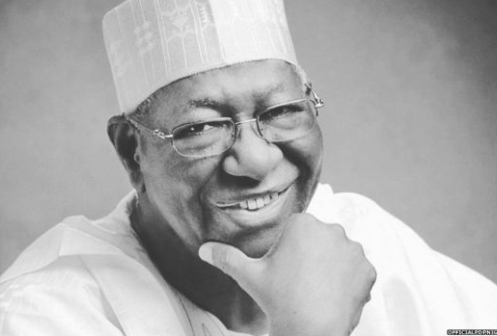Last Thursday, Nigerian newspapers raked in a considerable fortune, as associates, followers and hangers-on of Nigeria’s political fixer-in-chief, Chief Tony Anenih, fell upon themselves to congratulate the controversial chief, on his 78th birthday. The man they call “Leader” is certainly a cat of many lives, and under Goodluck Jonathan’s presidency, has reclaimed the one space he cherishes, in the dark, smoke-filled inner recesses of the cloak-and-dagger world of politics, where he wields effective powers of influence and control. Tony Anenih is a genuine enigma; and many of his associates will swear that he is one of the greatest things to happen to them, as individuals or politicians. Not given to a lot of words, the sphinx-like quality is in fact his greatest attribute. A close friend I spoke with last week, assured me that while Chief Tony Anenih is arguably one of the richest people in Nigeria, most of that wealth is legit, as the dinosaur comes from an old landed aristocracy, in Edo State. He is also extremely generous, especially to his people and friends.
As a political scientist, I have always been interested in the prebendalist proclivities of Nigerian politics; a political space controlled by individuals like Chief Tony Anenih, with an extensive retinue of followers who must be kept in loyalty through an adroit, manipulative control of the levers of power and privilege. In such a political system, the masters of the prebend, like Anenih, necessarily and continuously survive at the heart of the political process, because that is where patronage resides and influence is effectively peddled! Chief Tony Anenih left the police force but found his métier in the NPN politics of 1983-1985. He entered national relevance as a zonal sidekick of the late General Shehu Musa Yar’adua, during the Babangida transition of the 1990s. He was a central figure in the HOPE 93 project of MKO Abiola, and would be sucked into the schisms which led to the annulment of the June 12, 1993 election.
Chief Tony Anenih did not oppose dictatorship, but was street-wise enough to become one of the greatest beneficiaries of the struggles of the Nigerian people to end military rule, emerging a chieftain of the new party of power in 1999, the PDP. As minister of works, Anenih sat atop billions of naira meant to fix Nigerian roads and by all accounts, failed woefully, in delivery. The man did not possess the ability for such deliverables as the office of minister obliges its occupant; he spent far more time indulging his extensive capacity for the rough and tumble of politics, arguing early in the Obasanjo years, that there was no vacancy in Aso Villa, come 2003. He was to prove his weight in gold, when the machinery he headed, delivered the massively-rigged elections which returned Obasanjo for a second term in 2003. But the seeds of crisis were also sown with that ‘victory’, as the despot returned to power had a more sinister agenda of tenure elongation on his political plate.
For reasons we are yet to unravel, Obasanjo turned to Ibrahim Mantu to lead the campaign for the actualization of Third Term, much to the chagrin of masters, like Tony Anenih! I met Chief Anenih only once, and that was in February 2006. The din of Third Term Agenda and the vicious struggle between Obasanjo and Atiku Abubakar was reverberating in every corner of Nigeria. A taciturn Anenih was playing “siddon look” as Mantu’s effort began to unravel. When it became almost hopeless, Obasanjo reached the old dinosaur to lend his expertise to the Agenda; it proved too little, too late. Nigerians defeated Third Term and as part of his vengefulness, Obasanjo disgraced Tony Anenih by openly removing him from chairmanship of the PDP’s BOT. No sooner had that setback been inflicted upon him, than the courts removed his protégé from power as governor of Edo State. In came Adams Oshiomhole, and for the first time in a long while, the fixer-in-chief was fixed: he lost his home base and was demystified in the smoke-filled, dark and dank, inner recesses of politics.
But if anybody thought Tony Anenih was finished, they did not reckon with the old cop and his street-wise adaptability. He snuggled up to Umaru Yar’adua and began to re-position himself to play a central role in Yar’adua’s imminent second term, which, unfortunately, was not to be, as Yar’adua succumbed to his condition.
The new situation was tailor-made for Chief Anenih to reclaim the upper ground: controversy about zoning; a president willing to dig a grave for agreements within his party and old men, finding new virility, almost as if they have ingested political Viagra! So between the feisty EK Clarke and the more taciturn Tony Anenih, Nigeria’s new dispensation under Goodluck Jonathan, found its defining individuals. Chief Anenih has returned to the place he knows best, at the heart of political society! A novice will suffocate in that environment: smoke-filled; dark and dank; cloak-and-dagger; thick with conspiracies; where prebends are defined; patronage distributed and punishment mercilessly administered! But therein, Chief Tony Anenih is a past master and one of the greatest survivors; a genuine dinosaur! The birthday tributes of the past week are in recognition of the man’s remarkable ability to survive, stay relevant and protect those under his wings! If Nigerian politics does not deliver for the Nigerian people, the reasons must be sought in its character and the cast of characters who determine its shape; sitting centrally amongst these characters is the great dinosaur, Chief Tony Anenih!


